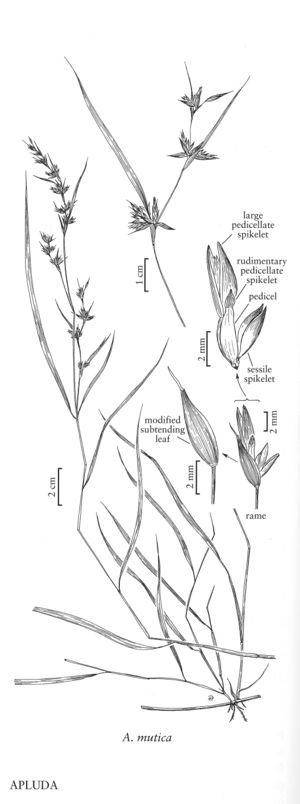Difference between revisions of "Apluda mutica"
Common names: Mauritian grass
Treatment appears in FNA Volume 25. Treatment on page 649.
FNA>Volume Importer |
FNA>Volume Importer |
||
| Line 17: | Line 17: | ||
-->{{Treatment/Body | -->{{Treatment/Body | ||
|distribution=Md. | |distribution=Md. | ||
| − | |discussion=<p>Reed (1964) reported finding | + | |discussion=<p>Reed (1964) reported finding Apluda mutica on chrome ore piles in Canton, Maryland (a temporary unloading ground for ores). The report has not been verified because his voucher specimens were not accessible at the time of writing. They were acquired by the Missouri Botanical Garden in 2001.</p> |
|tables= | |tables= | ||
|references= | |references= | ||
| Line 33: | Line 33: | ||
|basionyms= | |basionyms= | ||
|family=Poaceae | |family=Poaceae | ||
| + | |illustrator=Linda A. Vorobik and Hana Pazdírková | ||
|distribution=Md. | |distribution=Md. | ||
|reference=None | |reference=None | ||
| Line 38: | Line 39: | ||
|publication year= | |publication year= | ||
|special status= | |special status= | ||
| − | |source xml=https:// | + | |source xml=https://bibilujan@bitbucket.org/aafc-mbb/fna-data-curation.git/src/314eb390f968962f596ae85f506b4b3db8683b1b/coarse_grained_fna_xml/V25/V25_1570.xml |
|subfamily=Poaceae subfam. Panicoideae | |subfamily=Poaceae subfam. Panicoideae | ||
|tribe=Poaceae tribe Andropogoneae | |tribe=Poaceae tribe Andropogoneae | ||
Revision as of 16:16, 30 October 2019
Culms to 3 m, decumbent and rooting from the lower nodes. Blades 5-25 cm long, 2-10 mm wide, flat, attenuate distally. Inflorescences 3-40 cm; rames to 10 mm long, subtending sheaths 3.5-10 mm, narrowly ovate in side view. Sessile spikelets 2-6 mm; lower glumes narrowly elliptic-lanceolate; upper lemmas unawned or awned; awns 4-12 mm. Pedicellate spikelets broadly lanceolate; larger spikelets 2-5 mm; smaller spikelets 2-4 mm. 2n = 20, 40.
Discussion
Reed (1964) reported finding Apluda mutica on chrome ore piles in Canton, Maryland (a temporary unloading ground for ores). The report has not been verified because his voucher specimens were not accessible at the time of writing. They were acquired by the Missouri Botanical Garden in 2001.
Selected References
None.
Lower Taxa
None.
